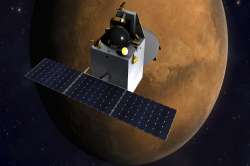5 Years of Mangalyaan: India's Mars Orbiter Mission | Here's all you need to know
Lauded across the world for its success and cost-effectiveness in its very first attempt, Mangalyaan had already fulfilled all its mission requirements, half-a-year in orbit.

India’s biggest achievements in space reached new heights when ISRO launched the Mars Orbiter Mission (MOM) on November 5, 2013. Five years ago, the Indian Space Research Organization (ISRO) grandly inserted India's first interplanetary mission into the Martian orbit on this day, i.e., September 24, from where it was going to circle the Red Planet for the next six months. Five years later, it’s still spinning.
Lauded across the world for its success and cost-effectiveness in its very first attempt, Mangalyaan had already fulfilled all its mission requirements, half-a-year in orbit. MOM blasted off atop a Polar Satellite Launch Vehicle (PSLV) rocket from Satish Dhawan Space Station, carrying five miniature scientific payloads. It reached its destination after a 298-day transit through space, pulling off a series of seven Earth-bound manoeuvres to perfection.
When Mangalyaan entered the Martian orbit, it has provided an overwhelming amount of data back to Earth. The Mars Colour Camera (MCC) on-board the orbiter had snapped 980+ images and prepared the Mars Atlas, as of 2018. Mangalyaan is the first artificial probe to click the full disk of Mars in one view frame and also, peek into the dark side of Deimos, a Martian moon.
After completing five years in the Martian orbit, the ISRO satellite is in good condition and continues to perform its tasks, as expected. But the orbiter has faced numerous challenges, during the course, even before it could launch. From a tight launch window to solar conjunction, it has had it all and yet, held itself together in the last 2119 days in orbit.
Here's all you need to know about Mangalyaan:
5 Years Of Mangalyaan: Mission concept
In 2008, the concept of the Mangalyaan mission began after the launch of the lunar satellite Chandrayaan-1 with a study in 2010 by ISRO. The Government of India approved the interplanetary project on 3 August 2012. The Indian Space Research Organization (ISRO) then completed the required study for the 125 crore rupees (19 $ million) orbiter. After this, the total cost of the project was 454 crores (67 $ million).
The work of connecting PSLV-XL launch C25 vehicle started on August 5, 2013. Mangalyaan was dispatched to Sriharikota on 2 October 2013 to connect with the vehicle. The development of the satellite was completed in a record 15 months. On 5 October 2013, NASA confirmed to provide communications and navigation support for the mission, despite the US federal government shutdown. During a meeting on 30 September 2014, NASA and ISRO officials signed an agreement to set the path for future joint missions to Mars.
5 Years Of Mangalyaan: India's first Mars expedition
India's first Mars expedition (Mars Orbiter Mission), Mangalyaan was an ambitious space project of the ISRO. Under which, on 5 November 2013, it was left to orbit Mars at 2.38 minutes. The project was also successfully launched by the Polar Satellite Launch Vehicle (PSLV) C-25 from the Satish Dhawan Space Center at Sriharikota in Andhra Pradesh. It is a technology demonstration project aimed at developing the design, planning, management operation required for interplanetary space.
5 Years Of Mangalyaan: Mission cost
The cost of this mission was 450 crore rupees (about 69 million dollars). This is the tenth of NASA's first Mars mission and a quarter of the Sino-Japanese failed Mars missions.
5 Years Of Mangalyaan: Mission objectives
The main objectives of Mangalyaan are to demonstrate India's rocket launch system, spacecraft construction and operational capabilities. In particular, the primary purpose of the mission is to develop the technology necessary for the operation, satellite design, planning, and management of interplanetary missions.
The secondary objective is to find the characteristics of the surface of Mars using indigenous scientific instruments. Apart from this, its main objective is to develop the technology required for satellite design, planning and management for the operation of planetary missions.
Also Read: ISRO makes history as Mangalyaan completes four years in orbit